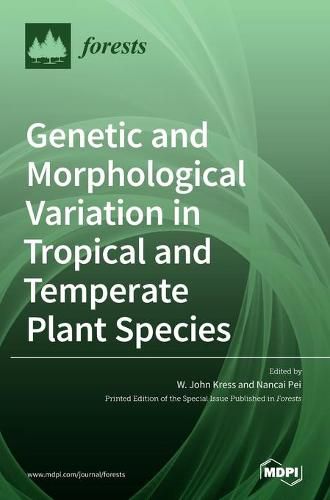Readings Newsletter
Become a Readings Member to make your shopping experience even easier.
Sign in or sign up for free!
You’re not far away from qualifying for FREE standard shipping within Australia
You’ve qualified for FREE standard shipping within Australia
The cart is loading…






This title is printed to order. This book may have been self-published. If so, we cannot guarantee the quality of the content. In the main most books will have gone through the editing process however some may not. We therefore suggest that you be aware of this before ordering this book. If in doubt check either the author or publisher’s details as we are unable to accept any returns unless they are faulty. Please contact us if you have any questions.
Plants provide the foundation for the structure and function, as well as interactions, among organisms in both tropical and temperate zone habitats. To date, many investigations have revealed patterns and mechanisms generating plant diversity at various scales and from diverse ecological perspectives. However, in the era of climate change, anthropogenic disturbance, and rapid urbanization, new insights are needed to understand how plant species in these forest habitats are changing and adapting. Investigations of plants in both little-disturbed, more natural environments, as well as in urban areas in which crucial green infrastructure is ever more important for sustaining complex human societies are needed. This Special Issue of Forests will focus on plant variation from the perspectives of morphology, genetics, and function, especially plant interactions with biotic and abiotic factors. Research articles may address any aspect of plant evolution and community phylogenetics (explorations of patterns and mechanisms from diverse organismal levels, e.g., molecular, population, species, community, landscape, and ecosystem), plant functional traits (e.g., nutrient traits of leaf, stem, root; reproductive traits of flower, fruit, seed), and/or responses of plant species to changing environments (e.g., water, atmosphere, soil, human activities). Studies providing quantitative evaluation or description of interactions of plants with animals and microbes, both in natural and urban environments, including terrestrial and aquatic systems, are also welcome.
$9.00 standard shipping within Australia
FREE standard shipping within Australia for orders over $100.00
Express & International shipping calculated at checkout
This title is printed to order. This book may have been self-published. If so, we cannot guarantee the quality of the content. In the main most books will have gone through the editing process however some may not. We therefore suggest that you be aware of this before ordering this book. If in doubt check either the author or publisher’s details as we are unable to accept any returns unless they are faulty. Please contact us if you have any questions.
Plants provide the foundation for the structure and function, as well as interactions, among organisms in both tropical and temperate zone habitats. To date, many investigations have revealed patterns and mechanisms generating plant diversity at various scales and from diverse ecological perspectives. However, in the era of climate change, anthropogenic disturbance, and rapid urbanization, new insights are needed to understand how plant species in these forest habitats are changing and adapting. Investigations of plants in both little-disturbed, more natural environments, as well as in urban areas in which crucial green infrastructure is ever more important for sustaining complex human societies are needed. This Special Issue of Forests will focus on plant variation from the perspectives of morphology, genetics, and function, especially plant interactions with biotic and abiotic factors. Research articles may address any aspect of plant evolution and community phylogenetics (explorations of patterns and mechanisms from diverse organismal levels, e.g., molecular, population, species, community, landscape, and ecosystem), plant functional traits (e.g., nutrient traits of leaf, stem, root; reproductive traits of flower, fruit, seed), and/or responses of plant species to changing environments (e.g., water, atmosphere, soil, human activities). Studies providing quantitative evaluation or description of interactions of plants with animals and microbes, both in natural and urban environments, including terrestrial and aquatic systems, are also welcome.